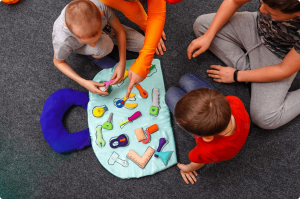Younger kids need to play. It’s their job! Babies and toddlers are in a phase where they must do fun activities to better explore and discover the world around them.
Yet, we all know that group activities are a lot more fun. For this reason, younger children also need their parents, caregivers, and friends to participate in special types of activities with them. These are called sensory activities, and here’s why they’re so crucial for children’s development.
Sensory play – as the name suggests – engages a child’s five senses, which they’ll use to interact with the world as they grow. Sensory activities also help them develop skills that will be essential in their later years.
Of course, younger kids have no clue that this is all part of a learning process. To them, it’s quite literally all fun and games. And that’s awesome!
Meanwhile, sensory play is hard at work. If you’re wondering how it strengthens your little one’s brain, here it is.
Sensory Activities Stimulate Children’s Cognitive Abilities
Logic, reasoning, visual processing, auditory processing…these are all cognitive abilities your child will hone with sensory activities.
As an example, the reason why so many kids mistake the numbers “6” for “9”, and the letter “W” for “M” is the natural underdevelopment of their visual-spatial skills. The more they play with toys such as baby books, the faster they’ll learn to tell the difference. What’s more, they’ll be learning different colours and describing the names of different sounds and textures.
They Sharpen Children’s Fine Motor Skills
Fine motor skills involve the small muscles of the hands and wrists. When children develop these skills, they properly learn to carry out tasks such as writing, drawing, colouring, grabbing things like toys or food, and dressing themselves.
The development of fine motor skills is a huge step, as learning how to do those activities by themselves is essential for building their self-confidence and self-esteem.
Sensory Play Increases Communication With Parents and Peers
Just like adults, some children are naturally more reserved and shy. While there’s no problem with that, we should strive to raise children who are able to communicate on their own.
Small children may communicate through babbling, pointing, or crying. As they grow up, they’ll need to start communicating for themselves: by politely asking, greeting, apologising, and thanking.
With that in mind, the accomplishment of sensory activities alongside friends, classmates, and caregivers is even more enriching than lonely play. It may look like a fun playdate when, in reality, it’s an exchange of knowledge and critical lessons the kids will take for the rest of their lives.
Sensory Play is the Best Way to Teach Children, Especially Younger Ones
So don’t forget to be your little one’s partner in play. Encourage them to read, feel, and play with toys that bring them different sensations.
From now on, you should marvel at the sight of your child during a playdate. After all, every single one of those magical sensory moments is shaping the best version of your little one.





